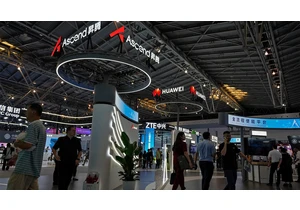China announced Tuesday it is banning exports to the United States of gallium, germanium, antimony, and other key high-tech materials with potential military applications, as a general principle, lashing back at U.S. limits on semiconductor-related exports.
The Chinese Commerce Ministry announced the move after the Washington expanded its list of Chinese companies subject to export controls on computer chip-making equipment, software and high-bandwidth memory chips. Such chips are needed for advanced applications.
The ratcheting up of trade restrictions comes as President-elect Donald Trump has been threatening to sharply raise tariffs on imports from China and other countries, potentially intensifying simmering tensions over trade and technology.
China said in July 2023 it would require exporters to apply for licenses to send to the U.S. the strategically important materials such as gallium and germanium. In August, the Chinese Commerce Ministry said it would restrict exports of antimony, which is used in a wide range of products from batteries to weapons, and impose tighter controls on exports of graphite.
The limits announced by Beijing on Tuesday also include super-hard materials, which would include diamonds and other synthetic materials that are not compressible and extremely dense. They are used in many industrial areas such as cutting tools, disc brakes and protective coatings. The licensing requirements that China announced in August also covered smelting and separation technology and machinery and other items related to such super-hard materials.
China is the biggest global source of gallium and germanium, which are produced in small amounts but are needed to make computer chips for mobile phones, cars and other products, as well as solar panels and military technology.
After the U.S. side announced it was adding 140 companies to a so-called “entity list” subject to strict export controls. China’s Commerce Ministry protested and said it would act to protect China’s “rights and interests” Nearly all of the companies affected by Washington’s latest trade restrictions are based in China, though some are Chinese-owned businesses in Japan, South Korea, and Singapore.
Both governments say their respective export controls are needed for national security.
China’s government has been frustrated by U.S. curbs on access to advanced processor chips and other technology on security grounds but had been cautious in retaliating, possibly to avoid disrupting China’s fledgling developers of chips, artificial intelligence and other technology.
Various Chinese industry associations issued statements protesting the U.S. move to limit access to advanced chip-making technology.
The China Association of Automobile Manufacturers said it opposed using national security as a grounds for export controls, “abuse of export control measures, and the malicious blockade and suppression of China.”
“Such behavior seriously violates the laws of the market economy and the principle of fair competition, undermines the international economic and trade order, disrupts the stability of the global industrial chain, and ultimately harms the interests of all countries,” it said in a statement.
The China Semiconductor Industry Association issued a similar statement, adding that such restrictions were disrupting supply chains and inflating costs for American companies.
“U.S. chip products are no longer safe and reliable. China’s related industries will have to be cautious in purchasing U.S. chips,” it said.
The U.S. gets about half its supply of both gallium and germanium metals directly from China, according to the U.S. Geological Survey. China exported about 23 metric tons (25 tons) of gallium in 2022 and produces about 600 metric tons (660 tons) of germanium per year.
AP researcher Yu Bing in Beijing contributed to this report.
—Elaine Kurtenbach, AP Business Writer
Melden Sie sich an, um einen Kommentar hinzuzufügen
Andere Beiträge in dieser Gruppe

When artificial intelligence first gained traction in the early 2010s,

You wake up in the morning and, first thing, you open your weather app. You close that pesky ad that opens first and check the forecast. You like your weather app, which shows hourly weather forec

How the Boomer wealth transfer could reshape global finance.
Born too late to ride the wave of postwar prosperity, but just early enough to watch the 2008 financial crisis decimate some

The Velvet Sundown is the most-talked-about band of the moment, but not for the reason you might expect.
The “indie rock band,” which has gained more than 634,000 Spotify lis

Sean “Diddy” Combs was convicted of prostitution-related offenses but acquitted of

A U.S. judge has ruled that China’s Huawei Technologies

Shares of U.K.’s Bytes Technology plunged over 27% on Wednesday after the IT firm said its operating profit for the first half of fiscal 2026 would be marginally lower due to delayed custome
